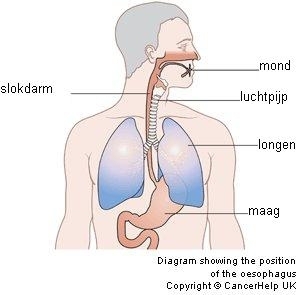Stomach cancer
Symptoms and causes
Symptoms and causesPossible causes
Regular consumption of fruit and vegetables appears to reduce the risk of stomach cancer. On the other hand, eating preserved and salted foods appears to increase the risk.
An infection with helicobacter pylori also increases the risk of stomach cancer. However, millions of people are infected with this bacterium, and most of them never develop stomach cancer. Other factors, therefore, must also be taken into account.
Moreover, people who smoke are twice as at risk as non-smokers. Alcohol consumption further increases the risk among smokers.
Studies have shown that people with a higher BMI also have an increased risk of developing cancer in the upper portion of the stomach. After all, obesity increases the risk of acid reflux, which in turn increases the risk of stomach cancer.
Symptoms
The first symptoms of stomach cancer are often acid regurgitations, 'burping' and a feeling of fullness. Most people with stomach cancer have experienced these symptoms for several years, but did not perceive them as alarming. These vague symptoms are the reason for many late diagnoses. More advanced symptoms of stomach cancer include a further loss of appetite, vomiting, blood loss and weight loss.
Diagnosis and treatment
Diagnosis and treatment
Staging
Once the diagnosis of stomach cancer has been made, it is important to gain the best possible insight into the extent of the disease, particularly by determining the stage of the illness as accurately as possible. This information determines the choice of treatment and the prognosis.
The tumour in the stomach is called the primary tumour. Usually, there is a gradual growth with damage to part of the stomach wall and then the entire wall. When cancer cells become detached from the original tumour and penetrate deep enough to reach the blood and lymph vessels, they can escape and colonise glands. If a loosened lump of cancer cells 'settles' elsewhere in the body, we speak of metastasis. Stomach cancer cells sometimes end up in other organs.
The stage is determined based on a globally used classification, the TNM classification (Tumour Nodus Metastasis classification), which looks at:
- the extent the tumour has grown through the stomach wall (T)
- whether or not lymph nodes are affected (N)
- whether or not there are metastases (M)
Treatment
The treatment of oesophageal cancer is complex and entails a specialised team. The most commonly used treatments are oncological surgery, radiotherapy and chemotherapy. Clinical trials can offer a way out sometimes and give you access to cutting-edge treatments.
Treatment centres and specialisations
Treatment centres and specialisations
Latest publication date: 15/05/2024
Supervising author: Dr. Monsaert Els
Something wrong or unclear on this page? Report it.
Supervising author: Dr. Monsaert Els







